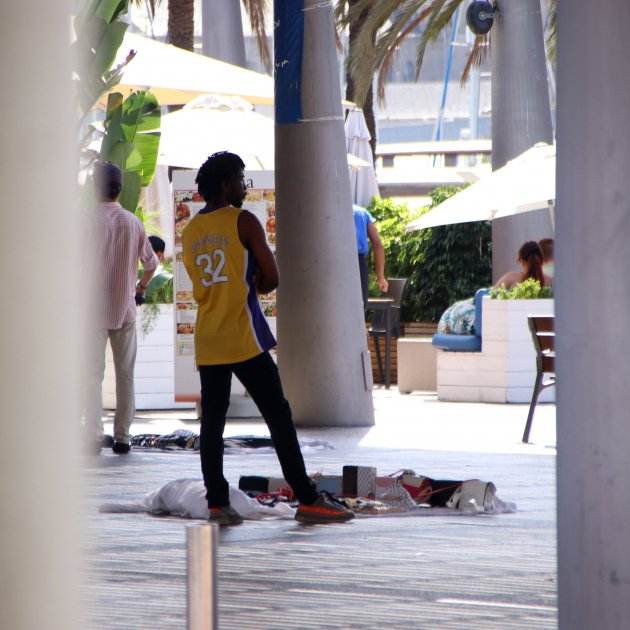The so-called top manta street vendors of Barcelona have denounced the return of a "brutal" persecution that they had not suffered since before the Covid pandemic that broke out in 2020. This is the explanation given to the ACN agency by the spokesperson for the street vendors union, Lamine Sarr, who points out that this summer the police have become "more violent" and that sellers notice more pressure from the city police, the Guardia Urbana, who "pursue" them and confiscate "a lot of material". For his part, the city's deputy mayor responsible for law and order, Albert Batlle, asserts that this "pressure" on the activity will continue and states that the agents have "precise" instructions to "combat" illegal sales. "We don't want this type of business in Barcelona," he says.
Sarr points out that before the pandemic there was already this same persecution that has now returned and regrets that the new city government under Jaume Collboni (Catalan Socialists) "criminalizes" them. However, Albert Batlle, deputy mayor responsible for policing, says the "pressure" on street vending has been "continuous" since August 2019, when they were already "very concerned" about the phenomenon. "We are in a situation that we have been working on for four years and it becomes more evident in the summer months," he says. Sarr acknowledges that the summer is a "difficult" period because there are more people "condemned" to sell goods on the street. In addition, confiscation of the goods they have for sale is more frequent this year, claim the sellers, whose informal 'top manta' name comes from the Catalan and Spanish word for the blanket (manta) on which they often spread out their wares.
More than 10,000 items confiscated in one weekend
Since the beginning of the summer, and as part of the so-called Plan Endreça, the Guardia Urbana have confiscated products intended for sale in the street and affirm that such operations will continue to be "forcefully" strengthened to guarantee "social coexistence, civility, law and order" in the city. During the last weekend in July, for example, the city police force confiscated a total of 11,255 products from top manta vendors, according to a Tweet from the police. And just last weekend, another 4,000 items were embargoed.
The verb endreçar in the name Plan Endreça is Catalan for "tidy up" and it takes in such areas as reinforcement of street cleaning and pest control, but, as Albert Batlle says, it is also aimed at "invasive activity" such as the illegal sales of goods. Lamine Sarr comments that Batlle "has the mentality of chasing and cleaning the streets as if he were not talking about human beings" and regrets that "the first objective" of new mayor Collboni is to "persecute and criminalize" the migrants who earn their living by hawking goods as they can.
According to data provided by municipal sources, in June there were 6,367 complaints lodged for the unauthorized vending of food, beverages and other products, almost half of all the complaints made for these types of actions from January to June 2023, which total 12,185. However, there is no data available on products confiscated since the beginning of summer, nor on specific complaints for street vending.
What is behind street vending?
The spokesperson for the street vendors' union emphasizes that behind the activity there is not a "desire", but an "obligation to survive". He affirms that the law "criminalizes" migrants who do not have the right to work when they arrive in Spain and recalls that the breadwinners who are now being persecuted were recently applauded for sewing masks and gowns for hospitals during the pandemic. Sarr asks Collboni to initiate more social projects. "We have taken the first step and have already formed a union and a cooperative. We are regularizing people every year," he says, with reference to immigration and working papers. And he reflects: "If our group can contribute to social projects, the administration, which has more power, can do more than us."
Batlle, however, affirms that behind street vending "there are always criminal and mafia activities" and he is convinced that the activity "harms" regular retailers, damages social coexistence in public spaces and "does no favours" to the sellers who dedicate themselves to it. Summing up, he makes it clear that it is a "prohibited" activity that will continue to be pursued and closes the door to any "negotiations": "There is no negotiation with illegal activity and crime." However, the deputy mayor responsible for law and order adds that in any case initiatives for job placement should be made "jointly from all the administrations".
